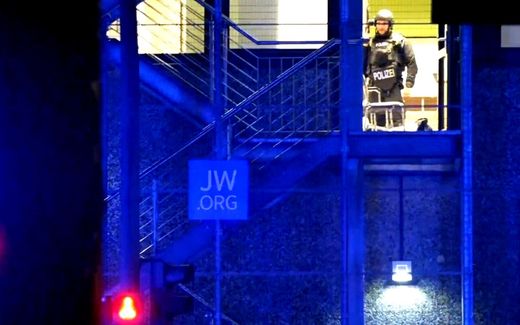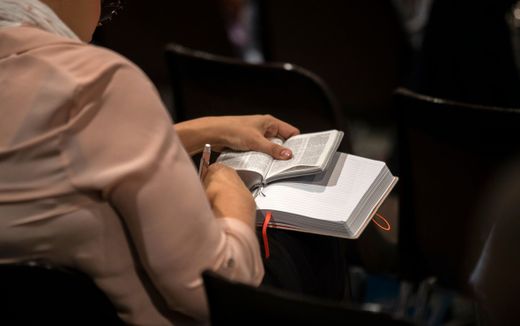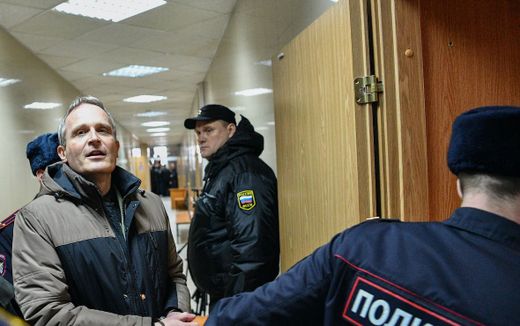Former Jehovah’s Witness was not greeted at grandmother’s funeral
12-02-2022
Western Europe
Janita van Hoeven, RD

Photo Flickr
Western Europe
The Dutch Henri Dahlem (50) from Aalten is a fighter. Jehovah’s Witnesses’ “discriminatory exclusion policy” must come to an end, and he is trying to achieve this in all possible ways.
It is 2010, and Henri Dahlem is summoned to the Jehovah’s Witnesses in Arnhem. At the time, he was promoting the interests of Kurds in the Netherlands.
Dahlem grew up as Jehovah’s Witness
Henry Dahlem grew up in a foster family that is part of the community of Jehovah’s Witnesses. Within the family, he suffers physical and psychological abuse. When he was 17 years old, he left his foster home.

In 2018, he told his story to the commission of Violence Youth Services. By order of the Dutch House of Representatives, the commission investigates non-sexual violence in youth institutions and foster families. Dahlem blames the Child Protection Board for not investigating his foster parents thoroughly.
After the commission’s report has been presented, Dahlem receives apologies from the Child Protection Board and the Inspection of Healthcare and Youth.
Former Minister of Legal Protection Sander Dekker asks Dahlem to set up an interest group for people who have been victims of psychological, physical or sexual abuse within a dependency relationship.
Dahlem is a Christian and visits a congregation of the Vergadering van Gelovigen (the so-called Brethern). “Only God’s grace prevented me from losing my faith.”
He thinks he sees one elder in the kingdom hall, but there are three. A judiciary committee, Dahlem immediately realises. A judicial committee is a group of three or more elders that is formed during internal judicial procedures at Jehovah’s Witnesses and judges whether someone is sufficiently repentant of an offence or not.
The elders confront him with his political activities and say, “If you do not repent of this sin and stop, we will expel you.” A week later, the official announcement takes place. Dahlem is excluded from the community because he is politically active and votes. “I was no longer welcome in the church. Other members were not allowed to contact me.”
A week after the announcement, Dahlem ran into a group of Jehovah’s Witnesses, including an elder, on Parkstraat in Arnhem. The group was not allowed by the elder to greet Dahlem because he was an apostate.
Completely ignored
At his grandmother’s funeral, who was a Jehovah’s Witness –three years after his exclusion– Dahlem “was completely ignored. Five hundred people were there, and nobody greeted me. That made me very angry and sad.”
The expulsion of a member for a breach of the rules is not an incident, but official policy within the Jehovah’s Witnesses, says Dahlem. A witness who steps down or is expelled from the organisation is, according to him, “declared socially dead. Family and friends are not allowed to make contact anymore. In practice, this means that such a person loses his or her social contacts. After all, one’s entire life takes place within the community. An exclusion means someone’s social death sentence.”
The Watchtower Society, as the religious community is often called, bases its exclusion of a witness, according to Dahlem, on, among other things, 1 Corinthians 5. “That chapter says that believers should not mix themselves with fornicators, greedy, idolators, slanderers or robbers and that they should remove the wicked from out of their midst. Some families take this so literal that they sleep, eat and live separately from their apostate family members. That can lead to mental and emotional problems by former members.”
Convicted
During a protest against the leaders of the Jehovah’s Witnesses in the city of Emmen in 2018, Dahlem meets Jim Winter. Winter is also a former Jehovah’s Witness, shunned six weeks earlier. Both of them are convinced that they need to do something against the exclusion policy of the organisation.
The idea subsided until, on 16 March 2021, Dahlem read a message that startled him. The Belgian Court convicted Jehovah’s Witnesses for inciting discrimination, hate and violence against former members. The organisation has to pay a fine of 96,000 euros for “shunning and socially isolating members who left the community.”
Appeal Belgian Jehovah’s Witnesses handled in March
The Belgian court will look at the appeal of the Jehovah’s Witnesses on 22 March. The Witnesses disagreed with the ruling of the criminal court in Gent.
Last year March, the Jehovah’s Witnesses were sentenced to a fine of 96,000 euros for inciting discrimination and hatred or violence against people who left the community.
At the end of November, the court in Gent handled the case. It decided that former members get the opportunity to write their defence. Dahlem: “Even if they lose the procedure in Belgium, we will continue.”
According to Dahlem, there are also committees in Switzerland, Poland and the Czech Republic that want to press charges against the Jehovah Witnesses for their policy of ex-communication. “The resistance spreads like an oil stain.”
The initiator in the Belgian case is Patrick Haeck, a high ranked Jehovah’s Witness who left the community after 35 years. He was part of a judicial committee that shunned members who left for years; until he found that shunning went a step too far. The Interfederaal Gelijkekansencentrum (Interfederal Equal Opportunities Centre) Unia and 15 victims joined the lawsuit.
The ruling comes as a shock for the former Dutch Jehovah’s Witnesses, Dahlem says. “This case did not take place in the United States of America, with its culture of claims, but in Belgian, a neighbouring country. In our private Facebook group of former members, the question arose immediately: When are we going to take action?”
Collective report
Dahlem contacts the Belgian Haeck, and on 9 October 2021, the Dutch committee Against JW’s Shunning becomes a reality. Dahlem is the president. The committee wants to collectively report the Jehovah’s Witnesses for inciting discrimination and damaging honour and good name through a civil procedure.
The committee hires a lawyers’ company that is willing to investigate the judicial possibilities for the former members. At the moment, about 20 former Jehovah’s Witnesses are supporting the initiative.
The top priority of the committee is collecting money for prior research. Dahlem expects to have a sufficient amount this month to start the procedure. The former members also want to organise activities such as symposia in the future. “We want to educate people about the policies of the Jehovah’s Witnesses and the effect they have on children, for example.”
Petition
In addition to the judicial path, Dahlem is also focussing on politics. The committee has started a petition in which they call the Dutch House of Representatives to come into action against the shunning policy of the Jehovah’s Witnesses immediately. The group of former members wants the “discriminating policy” of the organisation to be punishable by law, even if “the law needs to be changed.” Dahlem: “There is freedom of religion in the Netherlands, but these policies go much too far. Parliament should discuss these matters.”
In the meantime, 975 people signed the petition. When it has 1000 signatures, Dahlem wants to present it to the House of Representatives. At least 10 per cent of the signers are still part of the Jehovah’s Witnesses community, he knows. “They disagree with the policy but do not dare to say that out loud because they fear shunning. I am also doing this for them.”

As a result of the action, Socialist MP Van Nispen asked minister Dekker (Legal Protection) whether he saw “enough possibilities to fight shunning practices.” The minister writes at the beginning of December 2021 that shunning is not punishable by law. And that he did not receive “any signals that making the phenomenon punishable has any added value.”
Following that statement, Dahlem decides to report the matter to the police, hoping to start criminal prosecution. Together with former Jehovah’s Witness Jim Winter, he goes to the police. Winter presses charges against the president of the judicial committee of the local municipality Tilburg-Reeshof. Dahlem wants to sue the president of the judicial committee of the Jehovah’s Witnesses in Arnhem-Boulevard-Heuvelink.
Last week, a couple that was shunned at the end of last year pressed charges against the president of the Jehovah’s Witnesses. “It is a strong case because there is a recording of the announcement of their shunning available”, Dahlem says.
Procedure against Jehovah’s Witnesses is promising
Judicial expert Prof. Fokke Oldenhuis expects that a criminal procedure against Jehovah’s Witnesses because of their policy of shunning will be a complex case in the Netherlands. Oldenhuis is a former professor of religion and law at the University of Groningen. “A denomination can exert discipline over and break contact with a member who breaks the rules. The law gives it that freedom. However, the denomination goes too far if disciplining aims to declare a person socially dead. It can then no longer appeal to the Bible. Therefore, I encourage the criminal procedure against the Jehovah’s Witnesses.”
However, he expects more from a civil procedure (between two civilians). “If facts, comparable to those in the Belgian case, are discovered, I think such a procedure is promising. Former members have access to footage of high-ranking Jehovah’s Witnesses calling thousands of followers to avoid apostates. In that case, they misuse discipline.”
If the former members win the case, Jehovah’s Witnesses will have to change their policy, in addition to paying compensation, Oldenhuis states.
Could conservative Reformed churches also be charged for exerting discipline? Oldenhuis does not think so. “The Jehovah’s Witnesses explicitly check whether no one –also immediate family members– keeps in touch with the former member. As far as I know, that is not the case for any church denomination. On the contrary, I am often touched by how fathers and even more mothers continue to love their child and show that love, despite their grief over their child’s choice.”
The three charges are insults, defamation and slander. “We intend to get several former members to press charges and hope that these reports are linked to each other so that the prosecutor can take up the case.”
At the beginning of January, the police called Winters with the notice: this case is too old, we cannot do anything for you. Dahlem: “Unjustified, we think, because this social condemnation goes on and on. When I walk around in Arnhem, I am still ignored completely by Jehovah’s Witnesses.” The police are now investigating whether the complaint will be declared admissible after all. Above all, Dahlem hopes that the Jehovah’s Witnesses themselves come to their senses and stop shunning people. “Then our efforts are unnecessary.”
Blood bond
Jehovah’s Witnesses do not automatically exclude anyone who breaks the Biblical moral norms, Michiel den Hertog, spokesman of the Jehovah’s Witnesses Nederland, reacts in a written statement upon request. “But if a baptised member makes it a habit to break the norms and is not prepared to change his habits, he or she will be excluded, based on Biblical principles. All Jehovah’s Witnesses agree to live according to these norms when they, personally and well-consideredly, take the decision to be baptised.”
According to the spokesperson, each witness then acts “according to his or her religious conscience in applying biblical counsel to limit or terminate dealings with an excluded person.”
Den Hertog stresses that excommunicated people can still attend the organisation’s religious gatherings and receive spiritual care from the community’s elders. “The person is not left alone or, as some say, seen as an apostate. He is welcomed and encouraged to, whenever he wants, return to the congregation.”
Although the religious relationship between the shunned and his family changes, the blood bond remains, says Den Hertog. “The bond of marriage remains intact, and love and daily life within the family do not change. In other words, the normal feelings and dealings of the family continue to exist.”
A 2015 article in “De Wachttoren” (The Watchtower) said of exclusion that “everyone in the congregation can show principles-based love by avoiding contact and conversation with the excluded person (1 Cor. 5:11; 2 John:10,11). Thus, they support the strict teaching Jehovah has given him through the elders.”
There are more than 29,000 Jehovah’s Witnesses in the Netherlands. They are divided into 353 congregations.
This article was translated by CNE.news and published in Dutch daily Reformatorisch Dagblad on February 3rd, 2022.
Related Articles






